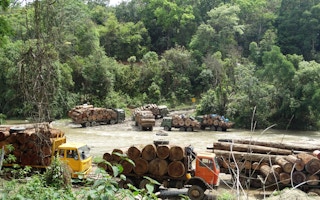Denmark last week placed an injunction on all Danish companies that prohibits them from selling teak imported from Myanmar on European markets.
The ruling comes after evidence that Danish timber company Keflico had violated the European Union Timber Regulation (EUTR) was brought to light by the Environmental Investigation Agency (EIA), a London-based NGO.
According to a statement issued by Denmark’s Environmental Protection Agency, audits were carried out at seven Danish companies that had imported teak from Myanmar in the last four years. Teak is a tropical hardwood especially prized for use in furniture and shipbuilding.
The results of the audits showed that authorities in Myanmar had not provided adequate documentation of where the timber for any given purchase came from and whether or not it was legally harvested, thereby making it virtually impossible for Danish companies to avoid importing illegal wood.
“None of the Danish timber importing companies, which the Environmental Protection Agency visited, could demonstrate that they adequately minimised the risk of importing illegally harvested timber,” the statement reads (translated from Danish). “The seven companies have now been ordered to follow timber regulation rules.”
The move by Denmark follows the precedent set by the successful prosecution in Sweden last November of the trader Almtra Nordic for violations of the EUTR.
It was discovered that the company could not show who had harvested its timber or where it was cut prior to being purchased from the Myanmar Timber Enterprise, the state-operated company that is responsible for the harvest and export of timber in Myanmar.
Almtra Nordic received a fine and an injunction that prevents it from importing teak from Myanmar until the company can identify and mitigate the risk of the timber it’s purchasing having been harvested illegally.
According to EIA Forests Campaigner Peter Cooper, the Danish ruling sets another precedent that other EUTR Competent Authorities must follow.
“Denmark’s leadership in EUTR enforcement underpins similar rulings already made in Sweden and leaves no doubt that anyone placing Burmese teak on the EU market under current conditions is in breach of European law,” Cooper said in a statement welcoming the decision by Danish authorities.
“
The Myanmar Timber Enterprise needs to urgently address illegality within its operations and provide access to independent monitoring of its operations — or risk permanently losing access to Europe’s lucrative teak marketet.
Peter Cooper, forests campaigner, Environmental Investigation Agency
“With Denmark setting a clear precedent on a case submitted by EIA, we now expect authorities in Italy, the Netherlands, Belgium, Spain and the UK to rapidly resolve the remaining 12 cases submitted by EIA.”
The allegations made by the EIA against numerous other European companies focus on the due diligence requirements of the EUTR, which hold importers responsible for adequately assessing and addressing the risk of illegally produced timber entering their supply chains.
EIA says it has submitted cases regarding teak imported from Myanmar by Antonini Legnami, Basso Legnami, and Bellotti Spa in Italy; Boogaerdt Wood, Gold Teak Holdings, and World Wood in the Netherlands; Crown Teak and Vandercasteele Hout Import in Belgium; Teak Solutions in Germany (a case that has since been transferred to Spain); and Moody Decking, Stones Marine Timber, and DA Watts and Sons (Wattsons) in the UK.
In October 2016, when EIA’s allegations against the companies were made public, many of them repudiated EIA’s findings in statements to Mongabay. For instance, Peter Tsounis, the CEO of Crown-Teak, told Mongabay in an email that, “Our due-diligence procedures are quite strenuous and our abiding with the EUTR…is strict.
There has not been one single container of teak…that has not been controlled by us and been properly and legally documented.” If a private business were to go around the Myanmar government and perform its own investigations in the field, Tsounis added, it would be “unlawful” and dangerous.
But EIA’s Cooper argues that, due to the high risk of illegality and lack of transparency in the operations of the Myanmar Timber Enterprise, it is probably not possible for any company to apply due diligence to Myanmar’s teak.
“The Myanmar Timber Enterprise needs to urgently address illegality within its operations and provide access to independent monitoring of its operations — or risk permanently losing access to Europe’s lucrative teak market,” he added.
This story was published with permission from Mongabay.com










